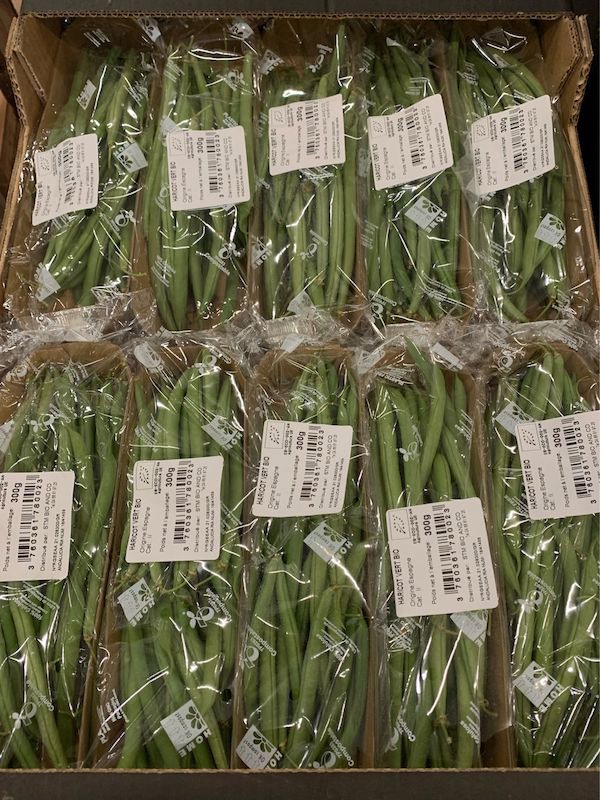STM Bio sells its organic green beans in eco-responsible packaging, in compliance with the requirements of the AGEC law. Although the sudden implementation of the law is making part of the sector cringe, Michael Sanchez Escriva, business development manager at STM Bio &Co, is very positive about the topic. “The new measures implemented are positive: polluting less by saving natural resources in the production and consumption phases. It is a good thing and we had to go through this, especially in the organic sector that wants to show real environmental values.”
Green beans, as well as other references like sweet potatoes, are now sold in a certified home-compost packaging. “The label is 100% compostable, biodegradable, and made of wood pulp from eco-managed forests. This packaging is labelled ‘home-compost’, which means that it disintegrates completely without any harmful effect on the quality of the compost. This has become essential in order to reduce our ecological footprint and preserve the environment.”

“The organic market is synonymous with modernity”
Besides this cellulose and wood pulp packaging, STM Bio also sells some of its citrus fruit prepacked in cotton nets. “We are really on a more ‘modern organic’ trend that knows how to adapt to its market. Although it was lagging a bit behind in the past, the organic sector now has no reason to envy its conventional colleagues. As far as we’re concerned, finding new eco-responsible packaging to comply with the law was not complicated because we did have a year to prepare. Having developed trusted partnerships for several years, we were able to be responsive. As for the additional costs generated by this new packaging, they are really anecdotal, in my opinion. Independent of the rising costs of raw materials and labor that affect the entire packaging sector, this eco-responsible feature has not had a significant impact on the price of fruit and vegetables. For example, we note a price delta of 0.05 euros [0.06 USD] for the cotton net packaging.”
“It is a common effort that will pay off!”
For Michael Sanchez Escriva, this slightly higher cost does not weigh much compared to the many advantages of the eco-responsible packaging. “We are going for a positive environmental impact. And I am convinced that consumers are willing to make this tiny effort in price in order to go in that direction. It also helps consumers reduce their amount of household waste since they can throw the packaging directly into their compost. As for recycling, the positive effects of the AGEC law on the sector should not be overlooked either. Recycling requires sorting and the creation of jobs. One ton of recycled waste creates 10 times more jobs than one ton of landfilled or burned waste, which means 300,000 more jobs in France! Additionally, by using French biodegradable and recyclable products, we depend less on foreign materials. Producers have had to equip themselves, which generated costs, but we must look at it as an investment for the future. And I believe that this common effort, on the part of both producers and consumers, will be rewarded.”
For more information:
STM Bio
commercialstmbio@outlook.fr
https://www.stmbioandco.com/
